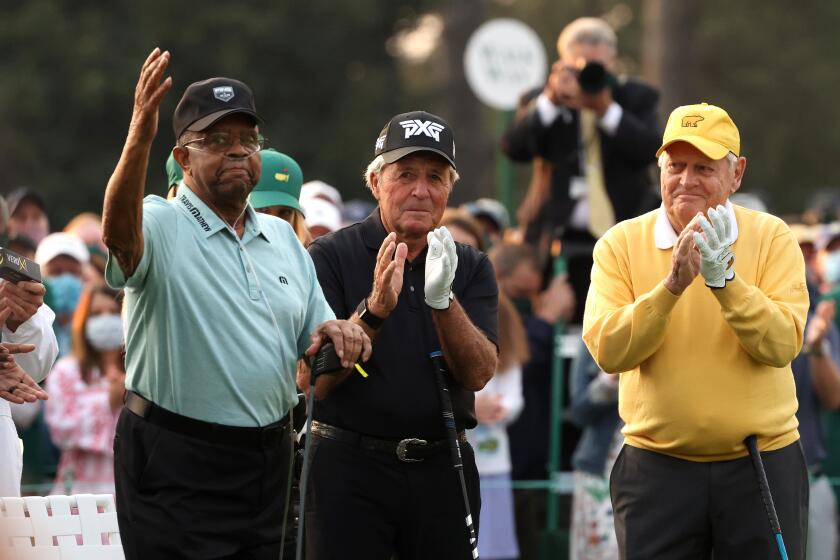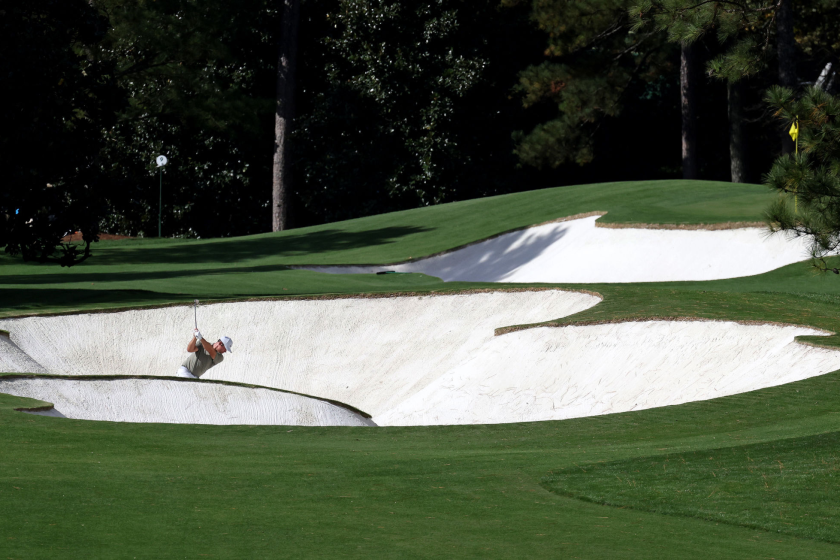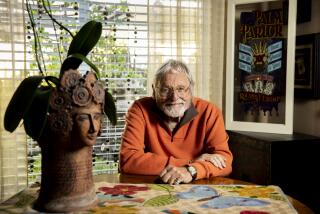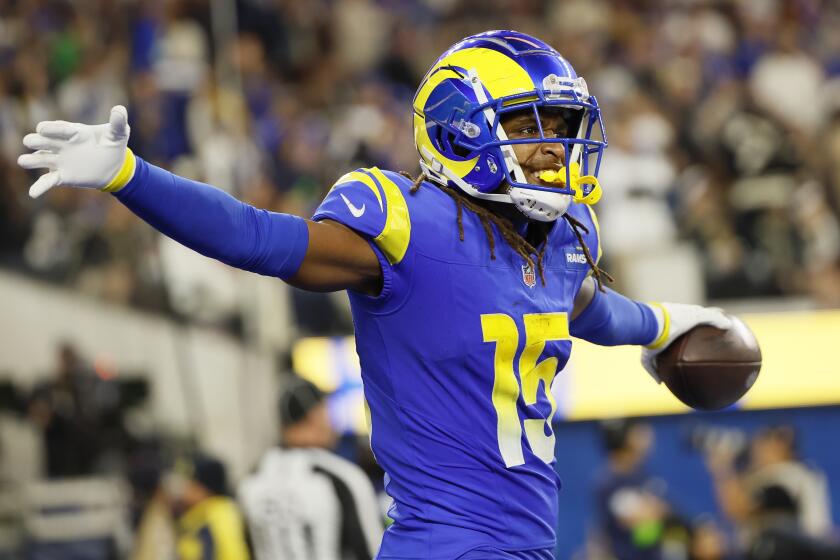I smuggled my fatherâs remains into the Masters. There heâll rest for eternity
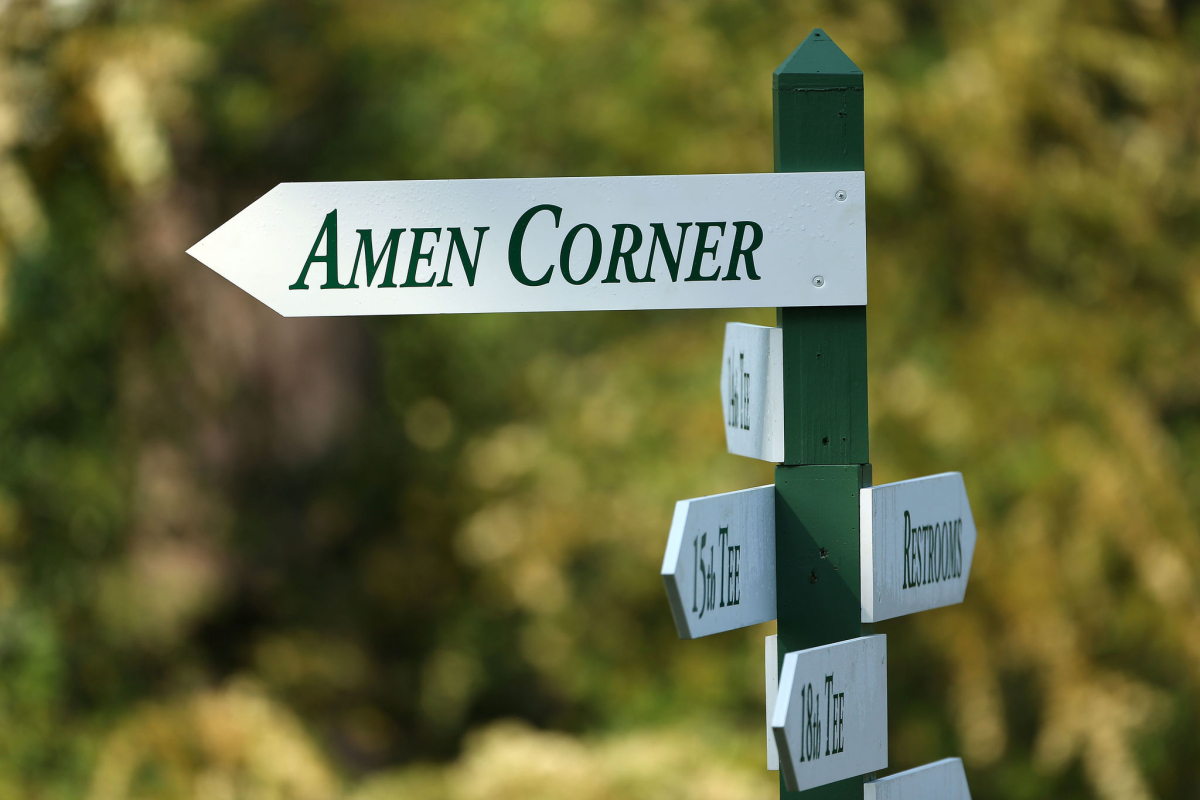
When you pick up cremated human remains in California, the mortuary makes a point of telling you that itâs illegal to spread the ashes without a permit. But their hearts arenât really in it. They seem to know everyone does it anyway.
I learned this when my father died. Heâs on my mind this week because the Masters was always his favorite golf tournament. A lifelong golfer born and raised in the South, Tommy Jackson fell for the tournament hard and never let go. But he never saw it in person.
My brother, Scott, and I have been luckier. Every few years, we somehow score a ticket or two. Once I drove five hours to Augusta, then waited outside Gate 9 for three more hours until a wobbly exiting patron sold me his beer-soaked day badge for $100. I only spent two hours inside the club, and youâre damn right it was worth it.
Lee Elder, the first Black golfer to compete in the Masters, joins fellow honorary starters Jack Nicklaus and Gary Player at Augusta National.
Scott and I always planned to take Dad to Augusta National, but we never could land a third ticket while he was young enough to go. So Dad watched religiously from home, thrilled his two boys were enjoying the worldâs greatest cocktail party.
The three of us played many memorable rounds together, and when Dad turned 70, we planned a pilgrimage to Pebble Beach. It was a classic guys trip, a big group of friends and two postcard-perfect days full of great food, stiff drinks and mediocre golf.
The highlight of the trip was the T-shirt we gave everyone to memorialize the weekend. It featured my favorite photograph of my dad, a shot of him on a South Carolina beach in the mid 1980s giving the camera the finger.
The expression on Dadâs face captures him perfectly. Impish and amused, heâs pretending to be perturbed, and the photographer is in on the joke. This is not an image of boiling Johnny Cash defiance, just a man happily refusing to take that moment, and life, too seriously.
When Dad turned 60, we sent the photo to a company that puts artistâs caricatures on golf balls and ordered three dozen bird-flipping patriarchs. We thought the balls would make great favors at Dadâs birthday party, but the company returned the picture with a letter politely explaining that they didnât traffic in âfilth.â But by the time we hit Pebble Beach, corporate Americaâs moral standards had fallen considerably. Kinkoâs was happy to sell us a dozen obscene T-shirts.
For us, all the father-son golf clichĂŠs were true. There were life lessons, coming-of-age moments, laughter and tears. Even some truly inspired club throwing. My dad and I played a handful of great tracks together, but golf for us was always about the company, not the course. The most I ever got out of a round with him was on a flat, featureless $15 muni, a day that reset my equilibrium when I was a lost and struggling college student.
Ten years ago, Dad lived near me in Los Angeles. Our lives were busy, and we werenât playing golf nearly as often as we should have been. But on one gorgeous late spring day, we drove to Rustic Canyon, a charming, links-inspired public course in Moorpark. Dad and I hadnât talked about it much, but I knew a series of bad personal and business decisions had put him in a tough spot financially.
Early on the back nine I offered some very sane advice that Dad didnât want to hear. He pushed back with something that said, in effect, his son worried too much. Innocent words that somehow set me off.
There was a brief argument, and Dad quickly let it go. But for some reason, I couldnât. The path to fixing his problems was so obvious to me, how could he not see it, too? As we closed out the round, I started swinging furiously, spraying balls everywhere and getting more livid as my shots flew farther off target. Suddenly I was the one who couldnât step back and see the obvious fix. We played 18 in silence.
My dad never knew how angry I was, and I still donât know what fueled it. A Freudian power struggle? In retrospect, all that matters is that this was the last time we ever played golf together.
::
Soon after that round, Dadâs health started to decline. When he was young, doctors treated his cystic acne with frequent X-rays. All that radiation was a miracle cure at the time. Sixty years later, it was a grinding death sentence.
My dad lived three more years, and we had plenty of great times together. But we never set foot on a golf course together again. Thatâs not how we want our sporting stories to end. This was not Ted Williams hitting a home run in his last at-bat. It was Tom Watsonâs 18th hole stumble at Turnberry in 2009, a gut punch for the ages.
Dad was 80 when he died in the spring of 2014. He had never been very specific about funeral arrangements, so we knew only two things: He wanted to be cremated, and Louis Armstrongâs recording of âOh, Didnât He Rambleâ would be playing when we spread the ashes. The question was, where? As soon as the emotional fog cleared, my brother and I started planning Dadâs return to Pebble Beach.
It looks like sand from a tropical beach, but the material gleaming from the bunkers at Augusta National actually comes from the mountains of North Carolina.
The night before our round at Pebble, we ate dinner and waited for dark. After a couple shots of good bourbon to honor our Kentucky-born father, we grabbed his ashes and headed out to the course. Thirty years after my dad flipped off the camera by the Atlantic Ocean, my brother and I were at the edge of the Pacific about to do the same thing to the California penal code. The circle of life was complete.
As we strolled down the 18th fairway toward the tee, the light of a cellphone briefly flickered in the distance. Someone else was out enjoying the gorgeous night.
As we approached the tee, my brother called out a greeting. He was trying to be friendly but caused a panic. Turns out, a now-startled young couple had found the moonlit seascape very inspiring. My brother and I werenât the only ones looking to break state laws at Pebble Beach that night.
After disrupting the coupleâs best-laid plans, my brother and I continued with our mission. With Louis Armstrong playing on my iPhone, we released my dad into the water around the 17th green, the 18th tee and fairway, where I left a small bit of paternal pixie dust next to the trunk of the famous cypress tree. Then my brother and I finished our work by the 18th green. In the Tap Room afterward, my brother and I shared good memories, a few tears, and far too much bourbon.
Turns out, a now-startled young couple had found the moonlit seascape very inspiring. My brother I werenât the only ones looking to break state laws at Pebble Beach that night.
Neither of us scored well the next day, but we didnât care. By the time we reached 18, I couldnât wait to hit that famously intimidating tee shot. I grabbed my driver, aimed right of the cypress tree and promptly pulled the shot left. After an anxious few seconds, my ball found dry land and stopped rolling. . . right where I had left Dad the night before.
There was a light wind that day, but Dadâs ashes were still there. I stopped for a moment and thought about all the fun weâd had playing golf. Then I stepped away, hit two more solid shots and rolled in the 15-foot putt for birdie.
At least thatâs the story Iâd like to tell. The truth is, I three-putted for bogey. Driving back to L.A., I couldnât shake the feeling that my father and I still had unfinished business on the golf course.
I pulled the shot left. After an anxious few seconds, my ball found dry land and stopped rolling. . . right where I had left Dad the night before.
The following spring, my brother scored badges for Masters Saturday. Just two tickets, but thatâs all we needed. We still had some of Dadâs ashes.
::
Security at Augusta National is notoriously tight, and since the penalty for sneaking in a cellphone is badge forfeiture, I could only imagine what would happen if we were caught smuggling in human remains. But my brother and I had an airtight alibi: âOfficer, thatâs not our fatherâs ashes. Thatâs half a pound of really bad cocaine.â
Dad was in my right pocket in a Ziploc bag as we made our way to the front gate. My hand shook when I dropped my wallet and keys into the dish at security. Then I steeled myself for the trip through the metal detector. Three quick steps, and then ⌠the joyful sound of silence. The ashes didnât contain any traces of Dadâs two titanium hips.
As the sun began to set, it was time to get to work. We had planned to spread Dadâs ashes under the famous oak tree by the clubhouse but quickly realized â duh â thatâs one of the most trafficked places on the course. Players were milling about after their rounds, and a Golf Channel reporter was conducting interviews nearby.
My brother and I had an airtight alibi: âOfficer, thatâs not our fatherâs ashes. Thatâs half a pound of really bad cocaine.â
But my brother and I hadnât flown across the country to lay up after splitting the fairway on a par five. A quick trip to the bar fortified us, and as we headed back to the great oak, my heart was pounding.
As we approached the clubhouse, a more calming realization came over me: Whatâs the worst thing that could happen? If we get kicked out now, weâve already had the time of our lives. And if we end up handcuffed while a security guard vacuums up our father, at least Steve Sands will get the whole thing on tape.
Donât take life so seriously. Wasnât that the message Dad had been sending all these years? In the photograph? On that $15 muni? In our last round together? So while my brother stood guard, I knelt down and pretended to tie my shoe. A moment later, my dad became a very small part of Augusta National Golf Club.
I took a deep breath and smiled. Now there was only one thing left to do. My brother and I took the last bit of ashes and marched down to Amen Corner.
Just like my dad always did, Iâll be happily watching the Masters from home this year. And every time they show that magnificent oak or a sweeping shot of Amen Corner, Iâll think about my father.
Hayes Jackson is a screenwriter living in Los Angeles.
More to Read
Go beyond the scoreboard
Get the latest on L.A.'s teams in the daily Sports Report newsletter.
You may occasionally receive promotional content from the Los Angeles Times.
